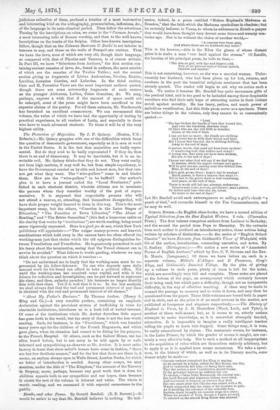mates, indeed, in a poem entitled "Before Raphael's Madonna at
Dresden," that the faith which the Madonna symbolises is obsolete; but he certainly believes in Venus, to whom he addresses in Estelle a prayer that would have been thought very devout some three-and-twenty cen- turies ago. Nor is he without the vision of another world,- " A country free from pain,
And where there are no husbands any more!"
This is his heaven,—this is the Eden the gleam of whoae distant gates is to make a man " row hard against the stream." Of Estelle, the heroine of his principal poem, he tells us that,— "She was no girl, with lips and fingers cold, Full of set phrases and of formal speech, Childish and bashful."
This is not surprising, however, as she was a married woman. Unfor- tunately her husband, who had been given up for lost, returns, and awakens in the poet the beautiful religious sentiment that has been already quoted. The reader will begin to ask why we notice such a book. We notice it because Mr. Bendall has quite uncommon gifts of the poetical kind, and is too good to be included among those despicable versifiers who find their only hope of attracting notice in their violent revolt against morality. He has fancy, pathos, and much power of melodious versification. Let this little poem servo as a specimen. There are better things in the volume, only they cannot be so conveniently quoted :—
" LOST.
She has broken the bands of love that bound her, And over the trackless, desolate ways Of life's dim sea she will drift to founder, Alone, at the end of days.
I can see her no more ; the clouds are shifting, And cover her in with their wrack and haze, But I know that beyond, she is drifting-drifting, Away to the end of days.
0 useless words, that need not have been spoken !
0 wandering soul, that suffers and strays I 0 loving ties, that need not have been broken, But are, to the end of days !
I know not what God will say if we find him In heaven, while the angels whisper and gaze— Will he give you me, casting your sins behind him, Mine, at the end of days?
Life's path grows drear ; hope's star is waning !
Earth passes, Is there a heaven that stays ?— Yet at last in the grave there is rest remaining, And peace, at the end of days.
There is work still left me, attempt, endeavour ; Success may come, honour, perchance ; men's praise, Or failure and loss—hut she, ah, never,
No more to the end of days!"
Let Mr. Bendall avoid such extravagances as calling a girl's cheek "a peach of God," and reconcile himself to the Ten Commandments, and he may do well.


































 Previous page
Previous page